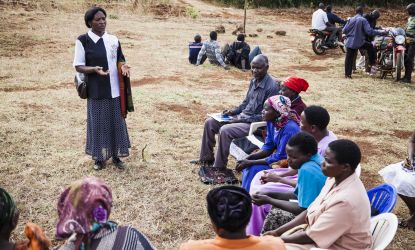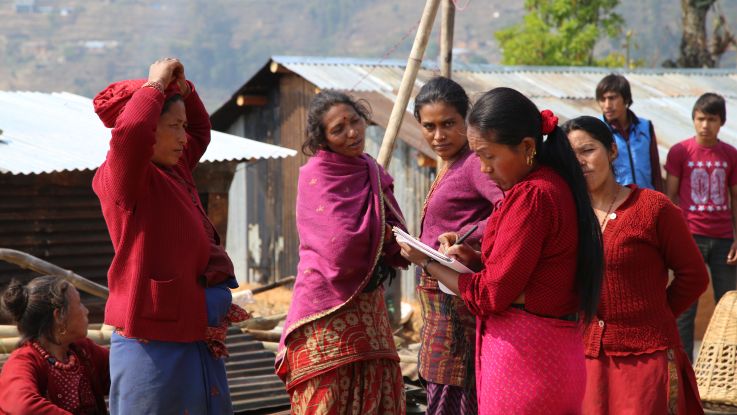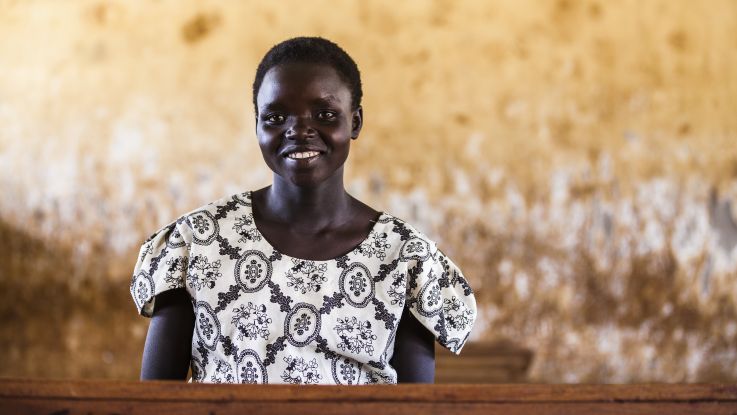DfID Programme Partnership Arrangement funding (PPA)
Feedback from DfID
Each year we submitted evidence of progress and achievements to DfID. Our annual report received an A+ rating for the final three years of the partnership, as we delivered on expected results.
DfID Management's response to ActionAid's 2016 Annual Report said:
The PPA programme supported a number of key improvements in respect to ActionAid's organisational capability. A key highlight has been the development of three innovative and successful pilot programmes on value for money, resilience and women's rights.
"Learning from those programmes is being used to inform ActionAid's new strategy and should lead to greater impact across all ActionAid programmes and ensure that women and girls' rights remain central to ActionAid's future work."
1) Investing in five ActionAid countries
Over 2011-2016, Afghanistan, Ethiopia, Nigeria, Pakistan and Uganda received flexible funding from the PPA, through ActionAid UK. The funding was used strategically to deliver on ActionAid’s 2012-2017 International Strategy People’s Action to End Poverty, through strengthening capacities to:
- deliver ActionAid’s Human Rights Based Approach (HRBA)
- create space for learning and innovation
- and adapt programmes to strengthen the impact on people living in poverty.
Over the five years we helped:
72,313
women and girls to raise their voice against harmful traditional practices like FGM
64,245
farmers to learn climate-resilient sustainable agriculture
99,072
girls, boys, parents and teachers to learn about children's education rights
Unrestricted funding enabled adaptive programming and we learnt some valuable lessons along the way, as you can see from one of our case studies from Afghanistan.
Case study: empowering women to claim their rights in Afghanistan
Afghan women identify their biggest problems to be education and illiteracy, a lack of job opportunities and domestic violence, according to Asia Foundation's 2014 survey.
ActionAid's programme: ActionAid Afghanistan works on women’s empowerment in Bamyan, Jowzan and Balk provinces by creating Reflect Circles – safe spaces for women to discuss issues affecting them, learn to read and write, and run businesses. Members set their own agenda and make their own decisions. The ultimate aim of the circles is to bring about social change, including improving the lives of women and reducing gender-based violence, through women learning their rights and how to claim them.
What worked well: Improving women’s reading, writing and arithmetic is really valued by participants, and is a vehicle for further empowerment and welfare. For example, improved literacy enables women to read signage and aids their mobility, as Fatima explains below. Women also reported that they feel more confident discussing household issues with husbands, children and parents.
Challenges: Reflect Circle membership was decreasing mainly due to challenges of livelihoods and poverty. And evidence that we were reaching the most marginalised members of the community was inconclusive.
Lesson learned: To improve targeting and retention of Circle members ActionAid Afghanistan needed to ensure that members can access a range of empowerment tools and livelihood opportunities through Reflect Circles. This would also ensure that Circles respond to the needs of the poorest members of the community on livelihoods support and economic empowerment.
Read more case studies from five ActionAid countries in our report
2) Investing in Federation-wide developments
We invested in the ActionAid Federation, by funding global systems, innovation projects, and training. This enables us to:
- become a more effective organisation, with quality tools to hold ourselves accountable
- evaluate our work, ensuring the voices of people we work with are at the centre of assessments
- and deepen our expertise in some key areas - such as resilience and women’s rights.
- 1
Global systems
to monitor and evaluate our programme work
- 2
Innovation projects
to learn about resilience, value for money and women's empowerment
- 3
Training
on how to run programmes using a human rights approach
Training on global monitoring systems
For ActionAid, it’s important to rigorously assess the impact of our work and hold ourselves accountable. We do this through monitoring and evaluation (M&E) systems and tools. We use participatory approaches, which put the voices and views of people in communities at the heart of assessments.
What we did: PPA funding helped us develop several of these tools, and also build our capacity to use them through training. For example, one of these is a set of participatory “power tools”, that allow us to assess with communities our impact on power relations, for example to interrogate if and how women are becoming empowered.
These tools are now available to all 45 ActionAid countries and help our local staff assess community needs, implement programmes in response, and monitor the impact of these programmes on people’s lives. We train our staff to ensure they are equipped to use the most up-to-date tools, as well as learn from past experience and each other, as Dennis Okello explains below.
Outcomes: As a result, we have continued to strengthen organisational effectiveness through systematised and evidence-based reporting. Recent initiatives from Year 5 of the PPA include: a series of five M&E workshops, increased peer to peer support through our Evaluations Accountability Global Leaders (EAGLES) network, improved use of tools and standardisation of evaluation guidance. As a result of sustained investments in M&E capacity, over 500 ActionAid staff were equipped to participate in a technical debate aiming to develop an improved M&E approach for the next International Strategy.

Learning participatory tools to improve monitoring and evaluation in Uganda
Dennis Okello, Monitoring and Evaluation Officer for ActionAid Uganda, attended training on the M&E tools to measure shifts in power. Following the training, Dennis said: "Attending the training really strengthened my understanding of power and shifts in power. I have shared the knowledge with my team and we are now applying it in our day to day work.
For example, I applied the tools during training for our programme partners, officers and Women Protection Centre officers in November 2016. We also visited some fishing villages in Kalangala district to practice applying the tools directly. We engaged the community to identify the resources most important to them, which were water, land and fishing nets.
They then voted on who has access to and control over these resources and it became clear that although the women had access, the men are the ones who had control. After identifying this, we then work with the community to empower women to gain equal control over the resources.
Personally the tools have helped me improve my use of participatory methodologies with communities and in generating information. I intend to continue rolling out the networked tool box in the 10 ActionAid districts where we have Women Protection Centres and collect stories on the use of the tool to be uploaded for shared learning with the wider network.
Kween Survivors Group meet to discuss issues such as lack of accessible clean water and violence against women
Kibuuka Mukisa Oscar/ActionAid
Innovation pilots on resilience and women's rights
The PPA as a funding mechanism is well-suited to funding innovation, due to its flexibility.
What we did: Unrestricted funding enabled us to fund three innovation pilots to strengthen our expertise in specific fields, including resilience and women’s rights, ensuring our approach remains at the cutting edge of research and practice.
Outcomes: The innovation pilot on women’s rights generated learning now being fed in to the new strategy, including on working with social movements, empowering the most marginalised and supporting women’s leadership. Following the Nepal earthquake, we adjusted the pilot to focus on building women’s leadership in emergency response. Insights from this research were integrated into our human rights based approach tools.
As part of the pilots, we produced evidence and research to define ActionAid's position and approach in these areas. We then developed a suite of resources providing guidance for all country programmes on how to design and implement programmes in resilience and women’s rights, which are listed below.
Resilience resources
We produced a resilience framework and accompanying handbook to provide practical guidance. We also developed a hazard-specific manual and a toolkit on measuring people’s resilience and research findings on urban resilience in three African cities.
- ActionAid's resilience framework: Through a different lens
- Resilience Handbook
- Resilience building: A guide to food, cyclone, earthquake, drought and safe schools programming
- Toolkit for measuring people's resilience
Women's rights resources
We produced action-research to explore how ActionAid can support grassroots organisations and social movements to tackle women's rights, and evaluated our impact to draw rigorous learning about how we can strengthen our approach.
How PPA helps deliver the UK's Aid strategy
The UK Aid budget, which represents 0.7% of gross national income, makes a difference in millions of people’s lives. By working with FCDO (DfID as was), ActionAid is able to develop strong programmes which help deliver the UK Aid Strategy, through funding mechanisms such as the PPA.
The PPA funding from DfID played a key role in ActionAid delivering its international strategy for 2012-2017.
ActionAid is now in a new strategic period with our international strategy Action for Global Justice 2018-2028. The achievements supported by the PPA will play a key role in enabling us to deliver our vision for a just world, particularly for women and girls.
Page updated 27 September 2022



